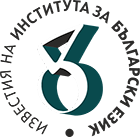Category: 2020_IIBE-XXXIII
PROCESSES OF ADAPTATION OF BULGARIAN NAMES IN TSARIBROD (SERBIA)
Ivana Davitkov University of Belgrade, Serbia Аbstract The present study is motivated by the legal possibility of spelling the names of members of the Bulgarian national minority in the Republic of Serbia, according to the Bulgarian spelling standard, as well as by the fact that the anthroponyms of the local population have not been the […]
Read More → PROCESSES OF ADAPTATION OF BULGARIAN NAMES IN TSARIBROD (SERBIA)DEGREE OF SIGN EXPRESSION IN TRANSLATIONS FROM RUSSIAN INTO OTHER LANGUAGES (Based on evaluative adjectives from the original text of M. Bulgakov’s “Master and Margarita” novel and its Bulgarian and English translations)
Ivo Panchev DGT. A.BG.2, Directorate-General for Translation, EC Abstract The comparative study of languages with various degree of relation is a linguistic subject that would always be relevant. Foreign language knowledge is an essential requirement for the deep analysis of a native language against the backdrop of an extensive palette of lexical phenomena. Foreign language […]
Read More → DEGREE OF SIGN EXPRESSION IN TRANSLATIONS FROM RUSSIAN INTO OTHER LANGUAGES (Based on evaluative adjectives from the original text of M. Bulgakov’s “Master and Margarita” novel and its Bulgarian and English translations)STRATEGIES AND TACTICS IN BULGARIAN PRESIDENTS’ INAUGURATION SPEECHES (The ritual in the political language)
Yoanna Kirilova Institute for Bulgarian Language, Bulgarian Academy of Sciences Abstract One of the most important features of the inauguration is that it is a verbalized ritual, corresponding to an initiation rite. This performative speech act, by its very nature, relates to the ancient man’s understanding of the power of the creative word. The purpose […]
Read More → STRATEGIES AND TACTICS IN BULGARIAN PRESIDENTS’ INAUGURATION SPEECHES (The ritual in the political language)EXPLAINED WORDS IN THE MIDDLE RHODOPE REVIVAL WRITTEN MONUMENTS WITH GREEK LETTERING (Features and trends in vocabulary variation)
Georgi Mitrinov Institute for Bulgarian Language, Bulgarian Academy of Sciences Abstract The study of vocabulary in Revival written monuments is important for the history of the Bulgarian language. The article deals with the lexical features of middle Rhodopes Revival written monuments. The vocabulary of foreign origin (Greek and Turkish) included in the texts is compared. […]
Read More → EXPLAINED WORDS IN THE MIDDLE RHODOPE REVIVAL WRITTEN MONUMENTS WITH GREEK LETTERING (Features and trends in vocabulary variation)ON SOME BULGARIAN-POLISH PARALLELS IN THE FIELD OF COLLOQUIAL LEXIS
Petar Sotirov Maria Curie-Sklodovska University in Lublin Abstract The subject of the study is the Bulgarian and Polish colloquial lexis in a comparative aspect. The main aim is to present some problems, results of previous studies and guidelines for future research in this field. The main sources for the language data are Bulgarian and Polish […]
Read More → ON SOME BULGARIAN-POLISH PARALLELS IN THE FIELD OF COLLOQUIAL LEXISQUO VADIS BULGARIAN STUDIES: PROF. MACHIEL KIEL ON BULGARIA AND BULGARIANS. PART II
Maxim Stamenov Institute for Bulgarian Language, Bulgarian Academy of Sciences Abstract Why Bulgarian studies? Each professional in the field has a personal story to tell on the subject. For Bulgarians, it is a matter of definite interest to find out why a foreigner may choose to dedicate their professional life to Bulgaria and Bulgarians instead […]
Read More → QUO VADIS BULGARIAN STUDIES: PROF. MACHIEL KIEL ON BULGARIA AND BULGARIANS. PART IIDIASTRATY AND DIACHRONY. CHANGES IN THE LEXIS OF MEDIEVAL BULGARIAN MANUSCRIPTS
Vanya Micheva Institute for Bulgarian Language, Bulgarian Academy of Sciences Abstract The paper examines the lexical changes in two copies of Hagiography of s. Mary of Egypt and in two texts of Hagiography of s. Paraskeva. The first copy of Hagiography of s. Mary of Egypt is in Bdinski zbornik from 14th c. and the […]
Read More → DIASTRATY AND DIACHRONY. CHANGES IN THE LEXIS OF MEDIEVAL BULGARIAN MANUSCRIPTS
